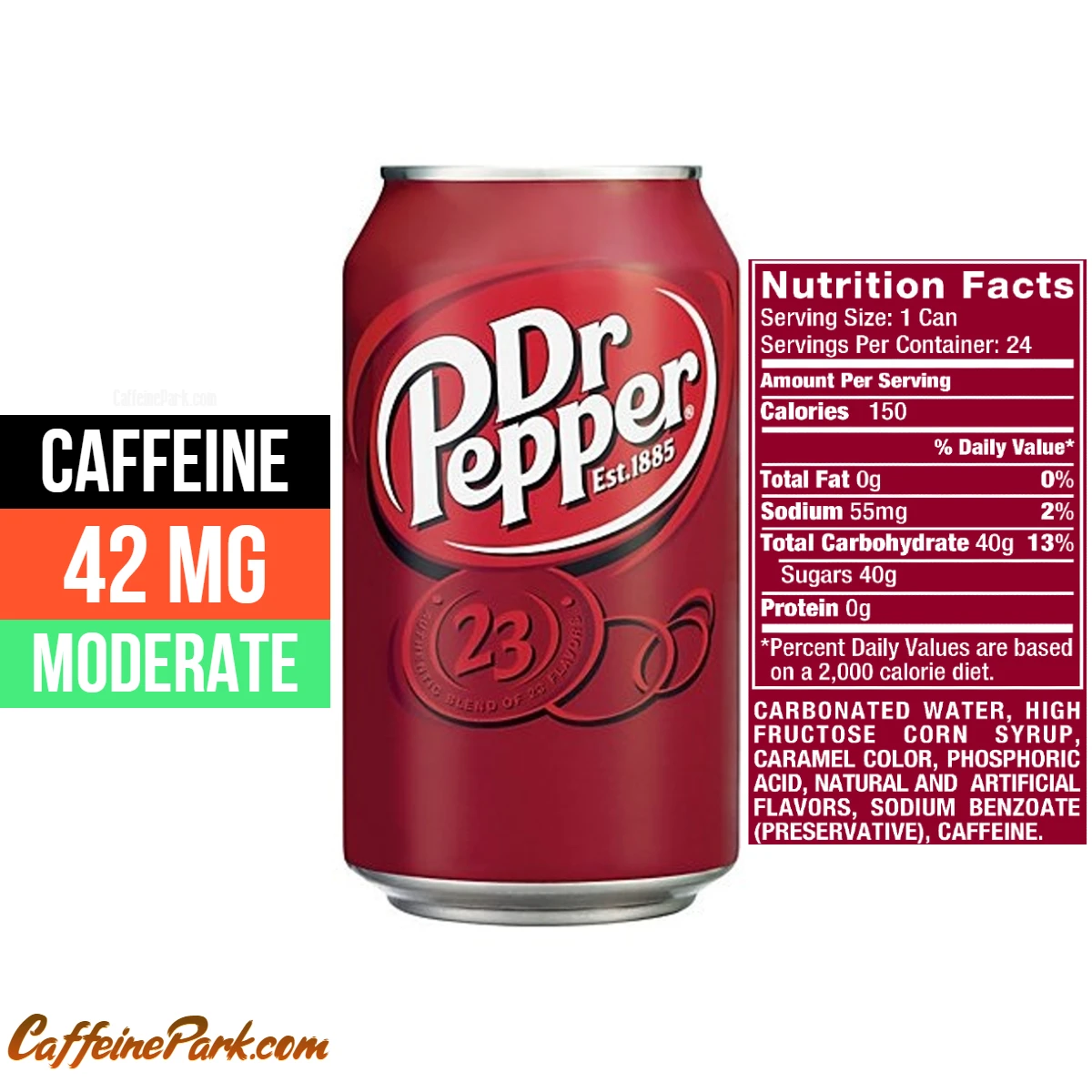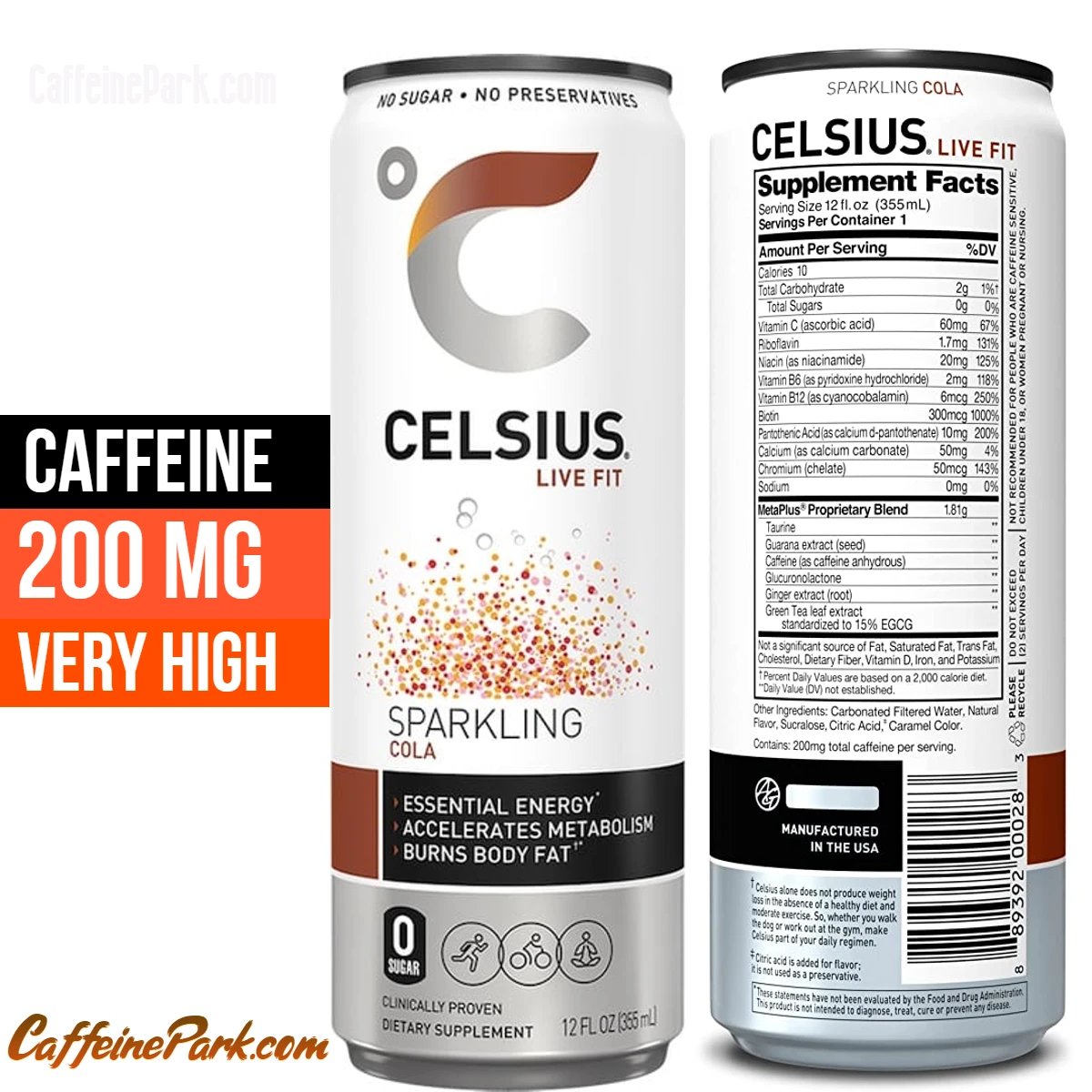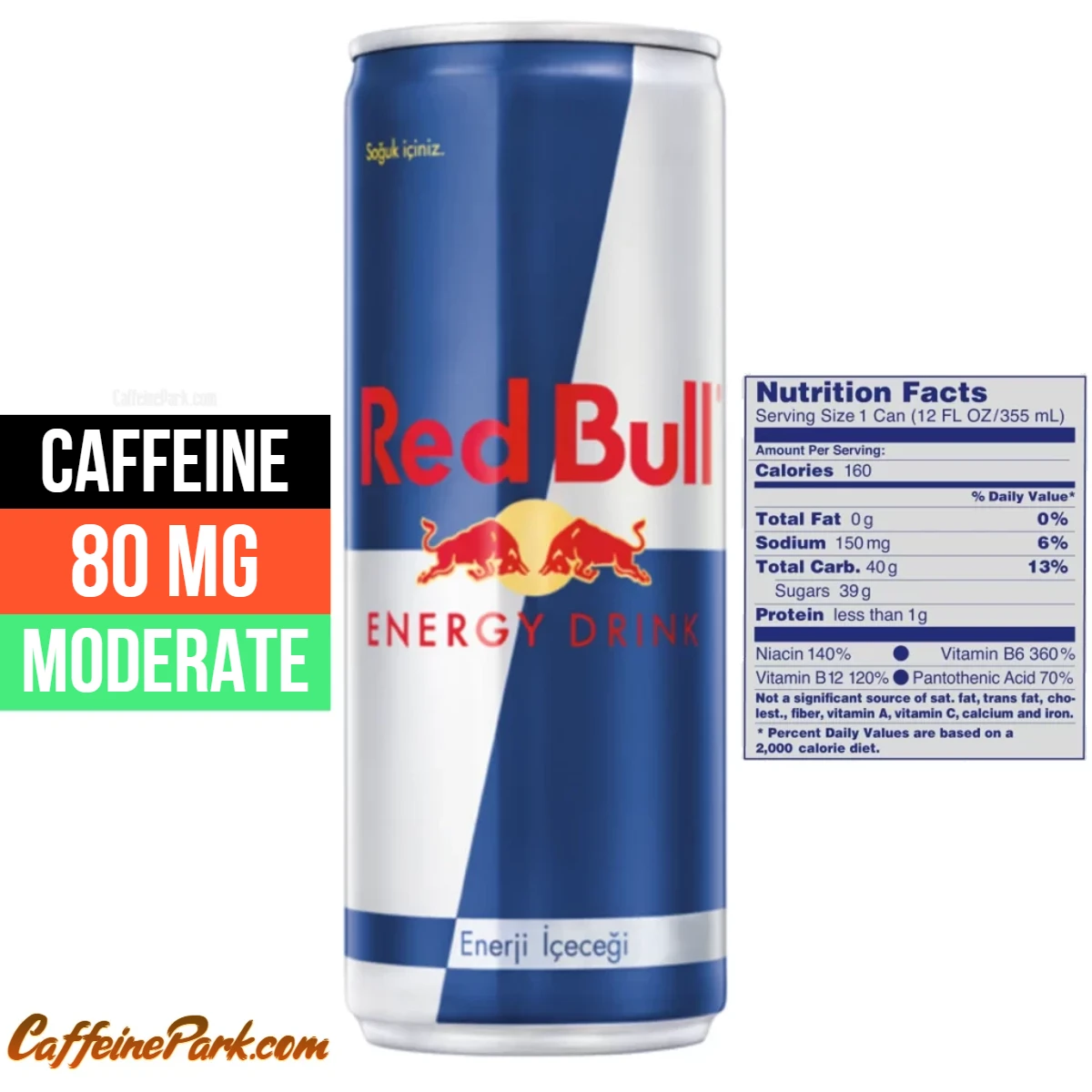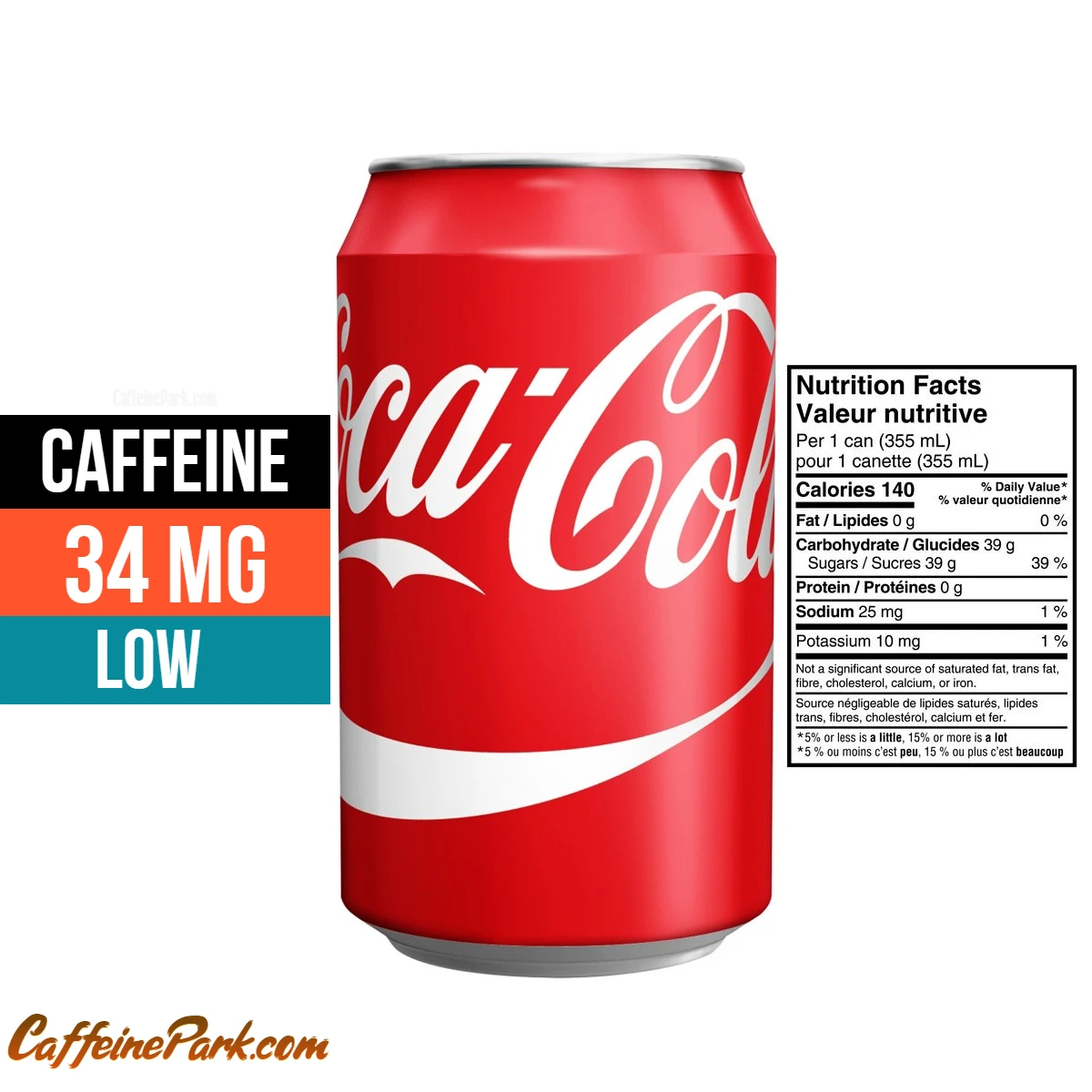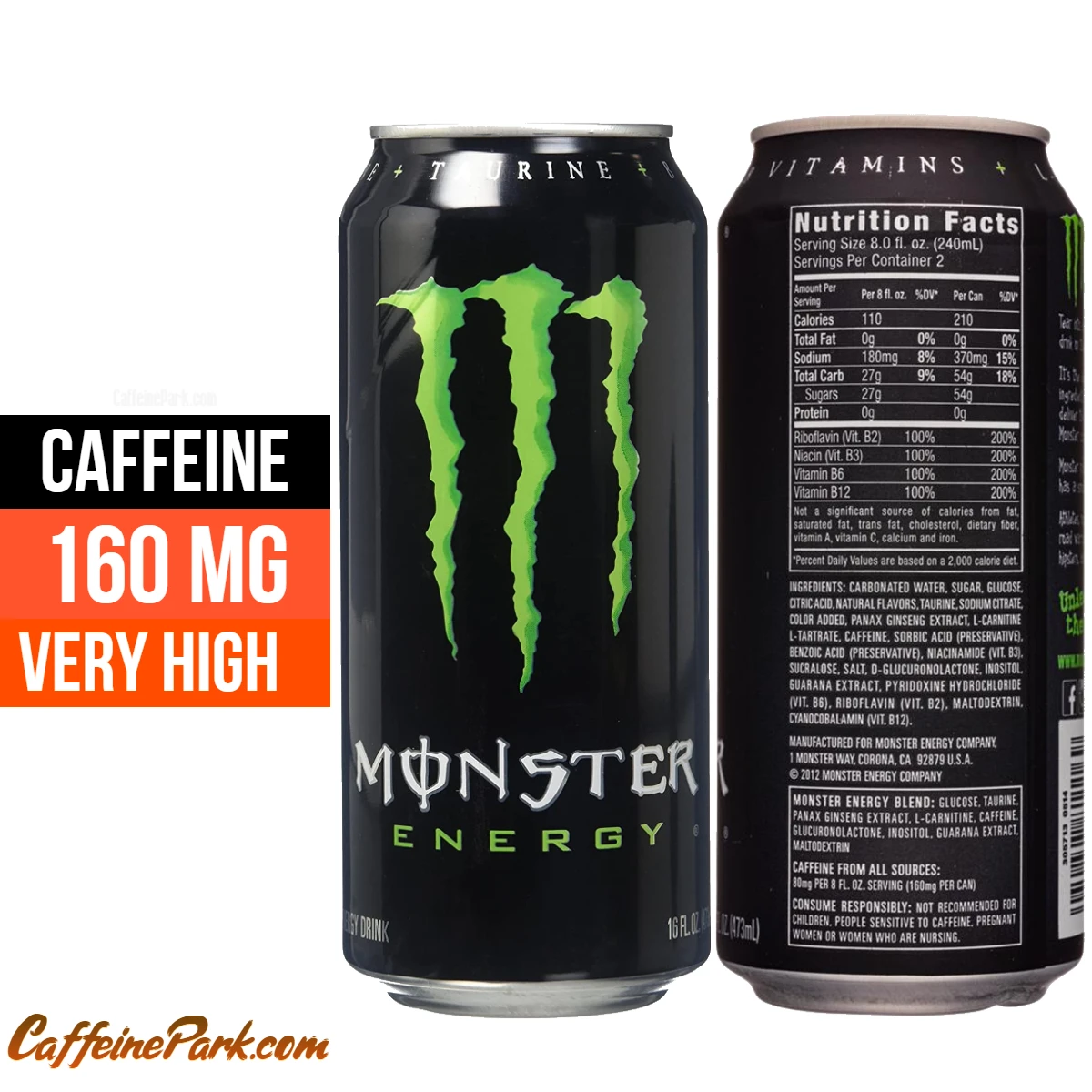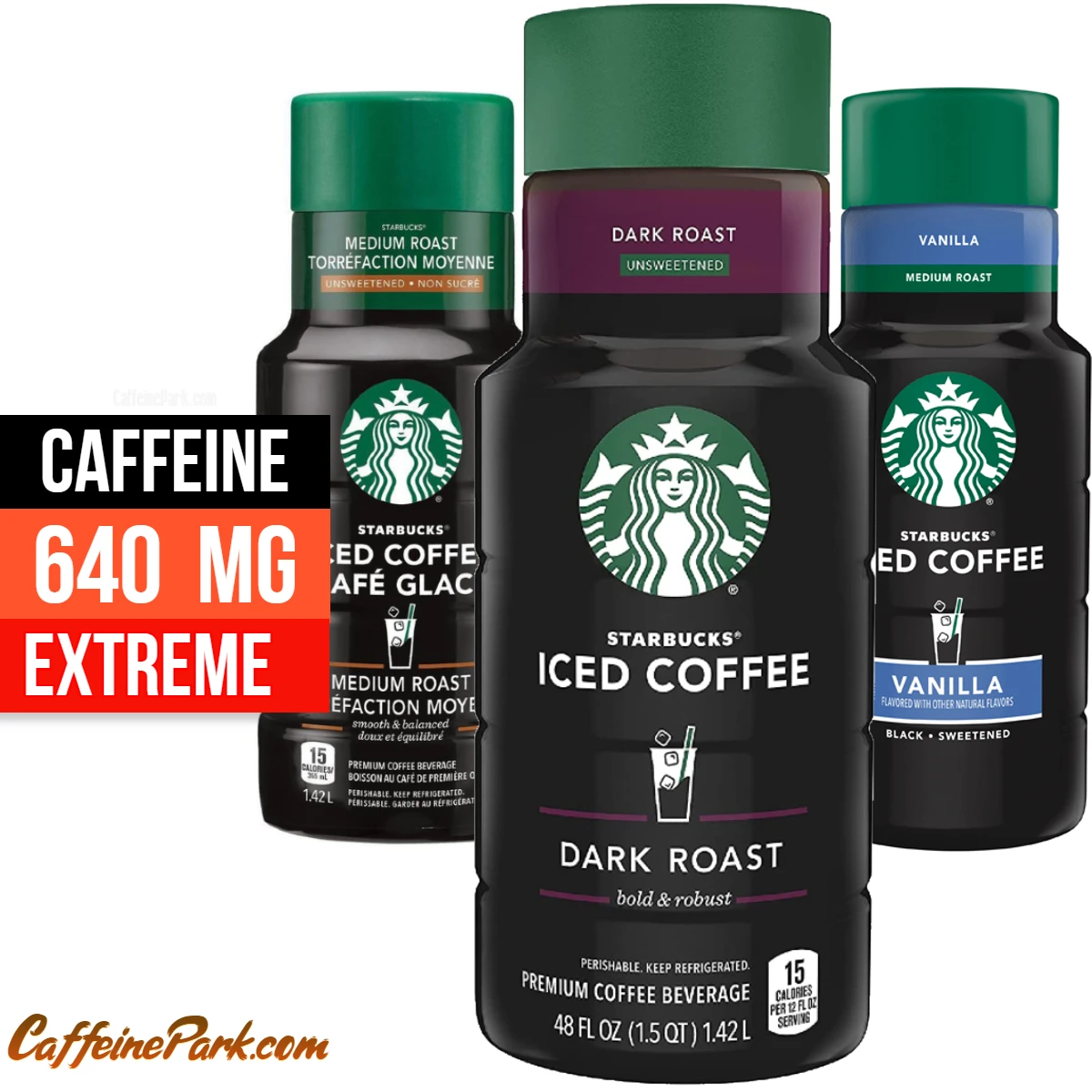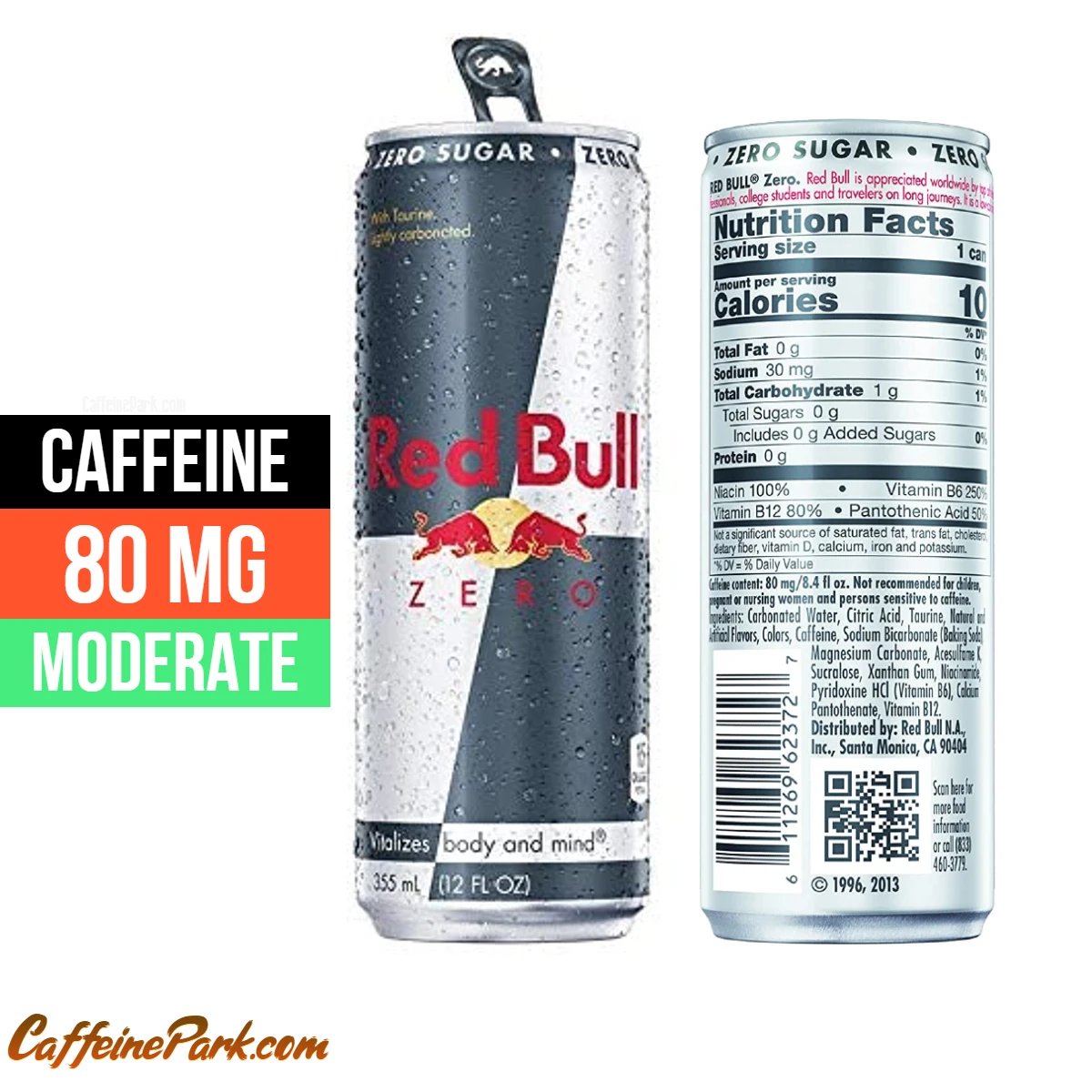
Red Bull Zero is a variant of the popular energy drink Red Bull that is formulated without caffeine. It is made with similar ingredients as regular Red Bull, including caffeine, taurine, B-group vitamins, and low-calorie sweeteners. If you’ve ever found yourself wondering about the caffeine content in Red Bull Zero, you’ve come to the right place. In this blog post, we’re diving deep into the world of energy drinks to unravel the caffeine mystery behind Red Bull Zero. So sit back, grab your favorite beverage, and let’s get started!
When it comes to Red Bull Zero, you’ll be pleased to know that it packs a punch in the caffeine department. Each 8.46 fl oz can of Red Bull Zero contains a refreshing 80mg of caffeine. That’s right, you can get your caffeine fix while enjoying the sugar-free goodness of this popular energy drink. But that’s not all—when we break it down, it means there’s approximately 9.46mg of caffeine per fluid ounce or a whopping 31.98mg per 100 milliliters. It’s definitely enough to give you the boost you need to tackle your day!
Now that you know the caffeine content of Red Bull Zero, it’s important to remember that moderation is key. While caffeine can provide a temporary energy boost, excessive consumption may lead to unwanted side effects. So, whether you’re studying for exams, powering through a workout, or need an afternoon pick-me-up, be sure to enjoy Red Bull Zero responsibly. Always listen to your body, know your caffeine tolerance, and make informed choices.
Does Red Bull Zero have caffeine?
Yes, Red Bull Zero contains 80mg of caffeine per 8.46 fl oz can. And 9.46 mg of caffeine per fl oz. (31.98 mg per 100 ml)
| Serving size | Caffeine Amount | Caffeine strength |
|---|---|---|
| 100ml | 32 mg | LOW |
| 8.46 fl oz can | 80 mg | MODERATE |
| 12 fl oz can | 113.5 mg | HIGH |
| 20 fl oz can | 189.1 mg | VERY HIGH |
- Caffeine Amount: 80 mg
- Caffeine strength: MODERATE
- Calories: 10cal
- Serving size: 8.46 fl oz can
- Sugar: 0 gram
Ingredients in Red Bull Zero
- Carbonated Water
- Taurine
- Citric Acid
- Sodium Citrate
- Caffeine
- Glucuronolactone
- Sucralose
- Acesulfame Potassium
- Inositol
- Niacinamide
- Calcium Pantothenate
- Pyridoxine HCI
- Vitamin B12
- Xanthan Gum
- Natural And Artificial Flavors
- Colors
- Pheylketonutics: Contains Phenylalanine
Compare caffeine in Red Bull Zero vs other
| Red bull Drinks | Serving Size | Caffeine |
|---|---|---|
| Red Bull Zero | 8.46 fl oz can | 80 mg |
| Red Bull Sugar-Free | 8.46 fl oz can | 80 mg |
| Red Bull | 8.46 fl oz can | 80 mg |
| Red Bull Simply Cola | 8.46 fl oz can | 32 mg |
| Red Bull Editions | 8.46 fl oz can | 80 mg |
| Red Bull Zero | 8.46 fl oz can | 80 mg |
| Red Bull Editions | 8.46 fl oz can | 80 mg |
Caffeine in Red Bull Zero vs Coffee
When it comes to comparing the caffeine content of Red Bull Zero and coffee, there are a few factors to consider. Let’s break it down and see how they stack up against each other.
- Red Bull Zero: A typical 8.46 fl oz can of Red Bull Zero contains 80mg of caffeine. This energy drink is known for its quick energy boost and refreshing taste. It’s a popular choice for those seeking a convenient pick-me-up during the day. With Red Bull Zero, you can enjoy the caffeine kick without any sugar.
- Coffee: The caffeine content in coffee can vary depending on the type of coffee beans used, the brewing method, and the serving size. On average, an 8 fl oz cup of brewed coffee contains around 95mg of caffeine. However, it’s worth noting that this can vary widely, with some specialty coffees having higher caffeine concentrations.
In terms of sheer caffeine content, coffee generally contains a bit more caffeine than Red Bull Zero. However, it’s important to consider factors beyond just caffeine. Coffee is often enjoyed for its rich flavor and the ritual of brewing and savoring a cup. On the other hand, Red Bull Zero offers a convenient and portable option when you’re on the go and need a quick energy boost.
Red Bull Total Zero Pack of 24

- Brand: Red Bull
- Item Form: Liquid
- Flavor: Zero
- Number of Items: 24
- Package Information: Can
Review
Red Bull Zero is a low-calorie, sugar-free alternative to the original Red Bull energy drink. It is formulated to provide a boost of energy, focus, and performance, and is generally well-received in terms of taste. However, it is important to consume it in moderation and to be aware of any potential side effects. If you are considering trying Red Bull Zero, it may be helpful to compare it to other energy drink options and to consider non-caffeinated alternatives as well.
History
Red Bull is an energy drink company founded in Austria in 1987 by Dietrich Mateschitz and Chaleo Yoovidhya. Mateschitz was inspired to create Red Bull after trying a similar drink during a business trip to Thailand, and he partnered with Yoovidhya, the creator of the Thai drink, to bring a similar product to the European market.
The original Red Bull energy drink was launched in Austria in 1987 and quickly gained popularity, particularly among young people and athletes. The company expanded to other countries in Europe and then to the United States in 1997. Red Bull has since become a global brand, with products available in over 170 countries.
Red Bull Zero was introduced in 2011 as a low-calorie, sugar-free alternative to the original Red Bull energy drink. It is marketed toward people looking for a healthier option or who are trying to cut back on their sugar intake.
Taste
The taste of Red Bull Zero is generally described as similar to the original Red Bull energy drink, with a slight metallic aftertaste. Some reviewers have noted that the artificial sweeteners used in Red Bull Zero give it a slightly artificial taste, while others have found it to be refreshing and invigorating. Overall, the taste of Red Bull Zero is generally well-received, although opinions may vary.
It is worth noting that the taste of Red Bull Zero may be influenced by individual preferences and taste buds. Some people may find the taste to be more or less appealing than others. If you are considering trying Red Bull Zero, it may be helpful to read reviews or try a sample size to see if the taste is to your liking before committing to a larger purchase.
Flavor
Red Bull Zero is available in a single flavor: the original Red Bull flavor. This flavor is a combination of caffeine, taurine, and B vitamins, with a sweet taste provided by artificial sweeteners such as aspartame and acesulfame potassium.
Red Bull also offers a number of flavored options in addition to the original flavor. These flavors include Red Bull Orange Edition, Red Bull Lime Edition, Red Bull Cherry Edition, Red Bull Summer Edition (tropical flavor), and Red Bull Energy Shot. These flavored options are available in limited release and may not be widely available in all locations.
Ingredients
Red Bull Zero is made with the following ingredients:
- Caffeine: A stimulant that can help increase alertness and improve mental and physical performance.
- Taurine: An amino acid that is thought to have a variety of health benefits, including aiding in muscle function and the regulation of the heart.
- B vitamins: Essential for energy metabolism and the proper functioning of the nervous system.
- Artificial sweeteners: Red Bull Zero contains aspartame and acesulfame potassium to give it a sweet taste without adding sugar.
- Other ingredients: Red Bull Zero also contains citric acid, sodium citrate, calcium disodium EDTA, and natural and artificial flavors.
It is worth noting that the specific formulation and ingredients in Red Bull Zero may vary by country. It is always a good idea to check the ingredient list on the product packaging to get a complete and accurate list of ingredients.
Comparison to Original Red Bull
One of the main differences between Red Bull Zero and the original Red Bull is the calorie and sugar content. Red Bull Zero is a low-calorie, sugar-free option, while the original Red Bull contains 110 calories and 27 grams of sugar per 8.4 fluid ounces can. This may make Red Bull Zero a better choice for people who are looking to cut back on their sugar intake or who are trying to watch their calorie intake.
Another difference between the two drinks is the flavor. While Red Bull Zero and the original Red Bull are both formulated to have a similar taste, some people have noted that the artificial sweeteners in Red Bull Zero give it a slightly different flavor.
Effectiveness
Red Bull Zero is intended to provide a boost of energy and improve mental and physical performance. Many people who have tried Red Bull Zero report feeling more alert and focused after consuming it, and some have even credited it with helping them power through a tough workout or study session. However, it is important to note that everyone’s body is different, and the effects of Red Bull Zero may vary from person to person.
Side Effects
Like any caffeinated product, Red Bull Zero can cause side effects in some people. These may include jitters, increased heart rate, and difficulty sleeping. It is important to consume Red Bull Zero in moderation and to follow the recommended serving size listed on the can. It is also advisable to avoid consuming Red Bull Zero late in the day, as it may interfere with sleep.
Alternatives
There are many alternatives to Red Bull Zero on the market, both in terms of energy drinks and low-calorie, sugar-free options. Some popular alternatives include:
- Monster Zero Ultra: A low-calorie, sugar-free energy drink from the Monster Energy company.
- Rockstar Zero Sugar: A low-calorie, sugar-free energy drink with a variety of flavors.
- XS Energy Drink: A low-calorie, sugar-free energy drink with a variety of flavors.
It is always a good idea to compare ingredients, nutrition information, and reviews before making a decision on which energy drink to try. It is also worth considering non-caffeinated options for a boost of energy, such as hydration drinks, sports drinks, or even plain water. Exercise, proper nutrition, and adequate sleep are all important factors in maintaining energy levels and overall health.
Other reviews
Red Bull Zero has received mixed reviews from consumers. Some people enjoy the flavor and find it to be a good alternative to regular Red Bull when they want the energy boost but don’t want the caffeine. Others find the artificial sweeteners to be too overpowering or prefer the taste of regular Red Bull.
One thing to keep in mind is that Red Bull Zero is not a traditional source of nutrition and should not be used as a replacement for a balanced diet. It is designed to provide a quick energy boost and improve mental and physical performance, but it is not a substitute for a healthy, well-rounded diet.
FAQs
Red Bull Zero contains 80mg of caffeine per 8.46 fl oz can.
Red Bull Zero contains approximately 9.46mg of caffeine per fluid ounce.
Red Bull Zero has a caffeine content of 31.98mg per 100 milliliters.
The caffeine content may vary slightly among different Red Bull products, so it’s advisable to check the label for precise information on each specific variant.
While moderate caffeine consumption is generally safe, excessive intake may lead to side effects such as jitteriness, increased heart rate, and difficulty sleeping. It’s important to be mindful of your caffeine tolerance and consume Red Bull Zero in moderation.
Is Red Bull Zero caffeine-free?
No, Red Bull Zero contains caffeine. It is formulated to provide a boost of energy, focus, and performance, and caffeine is a key ingredient that helps to provide these effects.
Is Red Bull Zero safe to consume?
Red Bull Zero is generally considered safe to consume in moderation. However, it is important to be aware of any potential side effects and to follow the recommended serving size listed on the can. Some people may be more sensitive to caffeine than others, and consuming large amounts of caffeine or consuming it late in the day can cause negative effects such as difficulty sleeping, jitters, and increased heart rate.
Can Red Bull Zero be consumed with alcohol?
It is generally not recommended to mix energy drinks with alcohol, as the combination can lead to negative effects such as increased risk-taking behavior and impaired judgment. Caffeine can also mask the effects of alcohol, making it more difficult to gauge your level of intoxication. If you do choose to consume Red Bull Zero or any other energy drink with alcohol, it is important to do so in moderation and to be aware of the potential risks.
What is the difference between Red Bull zero and sugar-free?
Red Bull Zero and Red Bull sugar-free have similar ingredients but Red Bull Zero tastes much better. Red Bull Zero gives people a choice, they can choose red bull zero or red bull sugar-free. People who drink Red Bull sugar-free feel tired when drinking it, but people who drink Red Bull Zero feel energized. Red Bull Zero has more carbs and fewer calories. Red Bull Zero also tastes better than Red Bull sugar-free.
What is a Red Bull zero?
Yes, Red Bull Zero has less caffeine than the original Red Bull. Red Bull Zero contains 60 milligrams of caffeine per 8.4 fluid ounces can, while the original Red Bull contains 80 milligrams of caffeine per 8.4 fluid ounces. This makes Red Bull Zero a good option for people who are sensitive to caffeine or who want to consume less caffeine but still want the energy and performance benefits that caffeine provides. It is always a good idea to be aware of your caffeine intake and to consume caffeine in moderation.
Does Red Bull Zero have less caffeine?
Yes, Red Bull Zero has less caffeine than the original Red Bull. Red Bull Zero a good option for people who are sensitive to caffeine or who want to consume less caffeine but still want the energy and performance benefits that caffeine provides. It is always a good idea to be aware of your caffeine intake and to consume caffeine in moderation.
Is Red Bull zero Keto friendly?
Red Bull Zero may be suitable for people following a ketogenic diet, as it is a low-calorie, sugar-free energy drink. However, it is important to note that Red Bull Zero does contain artificial sweeteners, which may not be suitable for everyone following a ketogenic diet. Some people may prefer to avoid artificial sweeteners or limit their consumption.
It is always a good idea to check the ingredient list and nutrition information for any product and to consult with a healthcare provider or a nutritionist to determine if it is suitable for your specific dietary needs and goals. It is also important to remember that energy drinks should not be relied upon as a sole source of nutrition and that a balanced, whole foods-based diet is important for overall health.
Is Red Bull Zero healthier than coffee?
It is difficult to say definitively whether Red Bull Zero is healthier than coffee, as the relative health benefits and risks of different beverages can depend on a variety of factors. Both Red Bull Zero and coffee contain caffeine, which is a stimulant that can help improve mental and physical performance, but can also cause negative side effects such as jitters, insomnia, and digestive problems if consumed in large amounts or by people who are sensitive to caffeine.
Red Bull Zero is a low-calorie, sugar-free energy drink, while coffee is a low-calorie, naturally caffeine-rich beverage. Some people may prefer the taste of coffee to that of Red Bull Zero, and coffee has been linked to a number of potential health benefits, such as a reduced risk of certain diseases and improved cognitive function. However, it is important to note that adding sugar and cream to coffee can significantly increase its calorie and fat content.
Ultimately, the decision of which beverage to consume is a personal one and may depend on individual preferences and dietary needs. It is always a good idea to be aware of your caffeine intake and to consume any caffeinated product in moderation. It is also important to consider the potential risks and benefits of any beverage and to consult with a healthcare provider if you have concerns about your caffeine intake or overall health.
Does Red Bull zero sugar have carbs?
Red Bull Zero Sugar is a low-calorie, a sugar-free energy drink that contains 0 grams of carbohydrates per 8.4 fluid ounces can. This makes it a good option for people who are looking to limit their carbohydrate intake or who are following a low-carbohydrate diet, such as the ketogenic diet.
It is worth noting that Red Bull Zero Sugar does contain artificial sweeteners, which may have an impact on blood sugar levels in some people. If you are concerned about the effect of artificial sweeteners on your blood sugar or if you have diabetes, it is a good idea to consult with a healthcare provider or a nutritionist before consuming Red Bull Zero Sugar or any other product containing artificial sweeteners.
Read More:
Contents
- Does Red Bull Zero have caffeine?
- Ingredients in Red Bull Zero
- Compare caffeine in Red Bull Zero vs other
- Caffeine in Red Bull Zero vs Coffee
- Review
- FAQs
- Is Red Bull Zero caffeine-free?
- Is Red Bull Zero safe to consume?
- Can Red Bull Zero be consumed with alcohol?
- What is the difference between Red Bull zero and sugar-free?
- What is a Red Bull zero?
- Does Red Bull Zero have less caffeine?
- Is Red Bull zero Keto friendly?
- Is Red Bull Zero healthier than coffee?
- Does Red Bull zero sugar have carbs?
